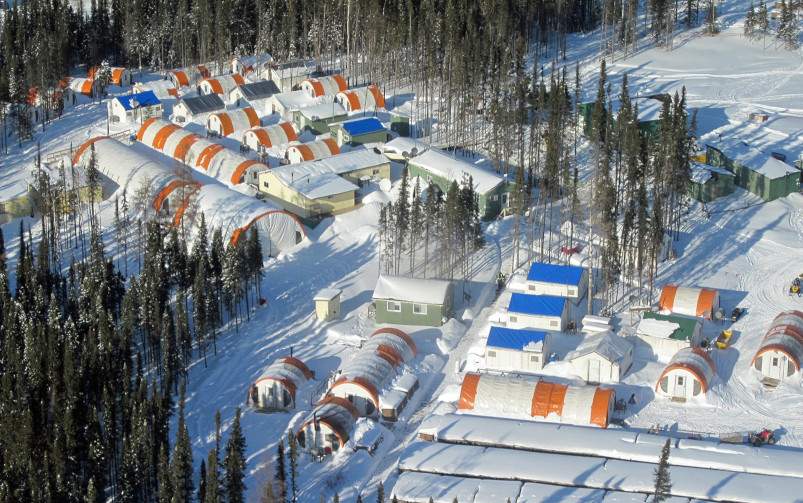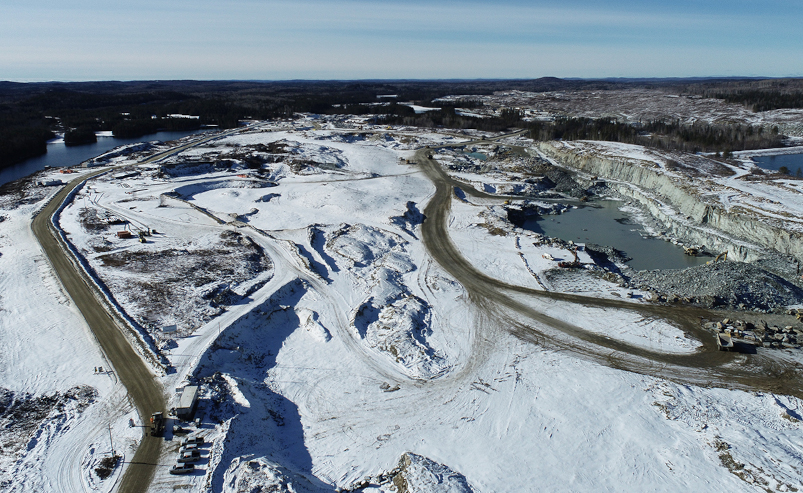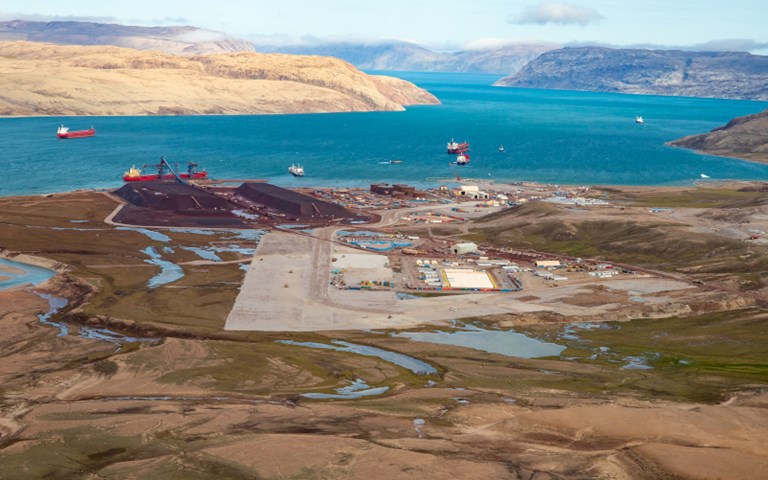The planned expansion for the Mary River mine would double its annual iron ore production to 12 million tonnes, but brings concerns over the impact it would have on the surrounding environment and wildlife. Courtesy of Baffinland Iron Mines.
Update: Baffinland announced on Feb. 11 that the blockade at the Mary River mine had been lifted. The company says it is in the process of restoring operations at the airstrip and tote road, as well as mining operations.
All operations at the Mary River iron-ore mine on Nunavut’s Baffin Island are suspended, as protestors continue to block the site’s airstrip and tote road.
A group of Inuit hunters from the nearby communities of Arctic Bay and Pond Inlet started protesting on Feb. 4 against a proposed expansion plan for the mine operated by Baffinland Iron Mines Corp.
The company is seeking to double its annual iron ore production from six million to 12 million tonnes and said it needs to build a railway from its Mary River mine to Milne Inlet and add another port dock at the location to support the increased output.
The Nunavut Impact Review Board (NIRB) had begun undergoing hearings on Jan. 24 about the expansion proposal when the protest started. In testimonies submitted to the NIRB by residents of Pond Inlet, members said that they are especially concerned about the environmental impact the expansion will have on the ecosystem and wildlife of the narwhals and caribou in the area.
“If any of those mining projects impact the environment and the wildlife, then that mining should be fully stopped to protect the animals. That is my point of view,” said Moses Koonark in video testimony. "I'm not worried about gaining money, but I worry about the wildlife because that's our food, that's our way of life too."
On Tuesday, Baffinland met with representatives of Nunavut Tunngavik Inc., the Qikiqtani Inuit Association, the mayor of Pond Inlet, the Government of Nunavut and the RCMP to discuss solutions to the blockade.
Baffinland said in a news release that it respects the rights to peaceful protest but needs to prioritize the safety of its employees. Over 700 staff members are at the mine site and are not allowed to leave. The airstrip has been shut down since Feb. 4, which means all flights, including search and rescues, food supplies and employee and contractor changes have been suspended.
“Baffinland personnel have had numerous meetings with organizers, both at the blockades and in Pond Inlet, imploring the protesters to relocate off the airstrip and allow runway maintenance to take place and flights to resume,” Baffinland said in a statement. “So far, these discussions have not yielded any progress.”
Baffinland did not return a request for comment before press time.
Related: The fallout from the decision to expand a Pilbara iron mine at the expense of an Indigenous People’s heritage site offers the opportunity to re-examine just what is free, prior and informed consent
The expansion plan was first proposed back in 2014. The miner said the project is necessary for the mine’s sustainability and profitability for the future. It promises that the Nunavut territory will gain economic benefits and said Inuit organizations will be paid almost $2 billion in royalties over the mine’s 30-year lifespan.
The Qikiqtani Inuit Association (QIA), who are responsible for negotiating with mining companies on behalf of the rights and interests of the community, have released a statement acknowledging the community's concerns that the project needs to slow down.
“It is abundantly clear to me that the [expansion] proposal before the Nunavut Impact Review Board has not been adequately developed,” said QIA president P.J. Akeeagok. “Success can be achieved when parties have time to work together to advance a common vision.”
But tensions between the parties involved, including QIA and the local communities, have long been brewing. The municipalities and hunters in the area have been dissatisfied with the way the QIA has represented the Inuit interests in the review process.
Protestors at the blockade said that they are tired of being ignored by Baffinland and regional organizations. “We would like to see actual negotiations with the most impacted communities and have us involved right away,” Naymen Inuarak, one of the hunters protesting at the mine site, told Nunatsiaq News.
According to Baffinland, protestors are also requesting to be recognized as a Designated Inuit Organization and have the Inuit communities receive their mining royalties directly. The company said they hear these requests but have no authority to permit these changes.
The NIRB will resume hearings, starting with a community roundtable in March. Soon after, the board will need to make a final recommendation on the future of the expansion plan.




